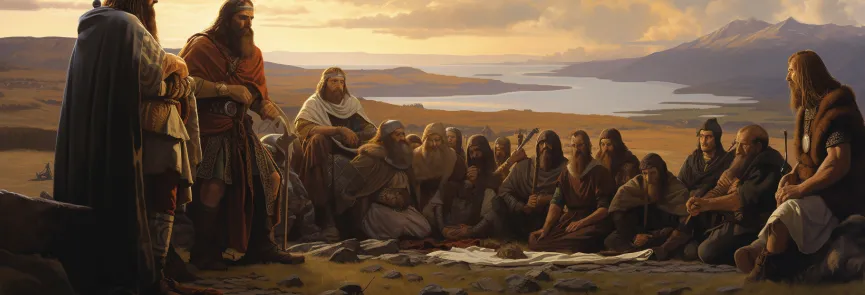Pictish Culture

Commands
The following command will set your culture to 'Pictish.'
The following command will change the culture of the specified county to 'Pictish.'
Information
| Name | Pictish |
| Culture ID | pictish |
| Heritage | Brythonic |
| Ethos | Bellicose |
| Language | Brythonic |
| Architecture | Continental European |
| Fashion | Northern European Continental European |
| Coat of Arms | Scottish |
| Military Equipment | Continental European |
Overview
The Pictish culture has a rich history and dates back to the Late Iron Age and Early Medieval periods in northern and eastern Scotland. The Picts, from whom the culture derives its name, were a confederation of tribal communities who were renowned for their unique language, art style, and resistance to both Roman and Anglo-Saxon invasions.
The Picts are famed for their intricate symbols often seen on stones, jewelry, and weapons. These pictographs exhibit exceptional creativity and craftsmanship, with keen attention to detail. They often represented animals, abstract designs, and mirrored symbols which are thought to carry some societal or religious significance. The most substantial evidence of Pictish culture exists in these carved stones, which remain scattered across Scotland.
A major highlight of the Pictish culture is their resilient nature; they successfully dominated Scotland for several centuries, even after repeated Roman attempts to overrun them. This testifies to the robust social and military structures that the Picts had built within their communities.
One of the most mysterious aspects of Pictish culture is their language, Pictish, believed to be a Celtic language, although this is debated due to lack of surviving linguistic records. The Picts left no written records besides their symbolic stone engravings which continue to be enigmatic.
In conclusion, the Pictish culture, full of mystery, artistry, and strength, holds an intrinsic allure that still captivates people to this very day.
Bellicose Ethos

Bellicose Ethos
This culture considers conflict and violence to be necessary states of existence; ingrained in its people is the idea that one should stand up and fight for their own.
- +50% Available Mercenary Companies
- +2 Prowess
- -10% Men-at-Arms Recruitment Cost
- -10% Men-at-Arms Maintenance
- +10% Levy Size
Each culture will have an ethos, which represents the core values, principles and attitude towards life that the culture has. It also determines which court types are available for kingdoms and empires.
Pictish Traditions
- Concubines
- Highland Warriors
- Hill Dwellers
- Refined Poetry
Each culture will have several traditions, which represent the main customs of a culture and can grant various effects. A culture can have up to five traditions in the tribal era, with every additional era reached granting an additional slot for Traditions.
Pictish Architecture
Continental European
